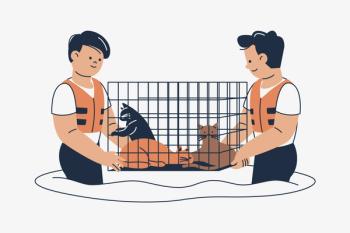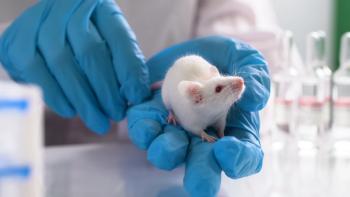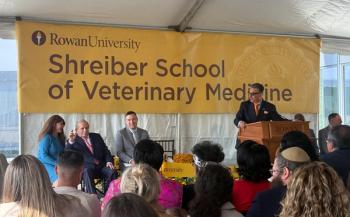
Animal welfare rises to forefront at AVMA
PHILADELPHIA- Animal agriculture resolutions and Dr. Bonnie Beaver's presidential speech set a welfare-related tone for this year's American Veterinary Medical Association's (AVMA) House of Delegates (HOD) meeting.
PHILADELPHIA— Animal agriculture resolutions and Dr. Bonnie Beaver's presidential speech set a welfare-related tone for this year's American Veterinary Medical Association's (AVMA) House of Delegates (HOD) meeting.
The HOD conference, held July 23-24 in Philadelphia, featured the unexpected passage of a resolution against the forced molting of layer hens (see related story, p. 1) and the deferment of a resolution to ban the force feeding of birds for foie gras production to the AVMA's Animal Welfare Committee. The committee is charged with conducting additional research on the issue.
But perhaps most significant was Beaver's address to delegates as she took office. Regarding welfare and the threat of animal activists, she advised the profession to take a stronger lead on animal welfare initiatives.
"For several years the issues associated with animal welfare have been on our radar screen, but as you know, they have become increasingly visible over the last few years," Beaver says. "In order to hold our position as the leader in animal welfare, the AVMA must become more proactive in several areas. First we must recognize that the animal industry and general public have been asking us to lead in this area. In fact, they expect it. However in the past we have resisted. It's time to get our heads out of the sand."
Facing issues
Beaver's comments come as AVMA endures unprecedented criticism concerning its welfare policies largely regarding the production of food animals. In June, animal rights groups took out a full-page ad in the
New York Times
featuring the headline, "Has anyone betrayed more animals than the American Veterinary Medical Association (see
DVM Newsmagazine
, August 2004, cover). Beaver, who revealed the advertisement to delegates on an overhead screen, says AVMA needs to re-emphasize the profession's role in animal welfare.
"Veterinarians are the ultimate authorities in animal welfare," she says. "It is important that we retain this authority in light of challenges by animal rightists and humane organizations, as has been evident in recent newspaper attacks."
Battling big bucks
Animal rightists' agendas are creeping into society disguised as welfare, Beaver adds. "The public is not aware of the slippery path ahead."
That's why AVMA must learn how to accomplish a lot with little funding, she says. While the membership organization boasts a small budget and staff, People for the Ethical Treatment of Animals devotes $17 million and 200 employees to push animal rights' initiatives. Comparatively, The Humane Society of the United States reports a $70 million budget and 300 staff members.
"As you know, our $24 million budget is divided into many areas," Beaver says. "Currently we devote $200,000 and one full-time employee to animal welfare activities. Truly a mouse that roars."
PR savvy
AVMA will attempt to make more noise on animal welfare issues, aided by its efforts to become more media friendly in the promotion of veterinary medicine. Beaver announced the recent creation of the AVMA Task Force on Communications, charged with finding ways to send messages within the profession and to society.
"Many things are underway to make sure we do a better job with communications," she says. The Communications Division at AVMA is already undergoing major changes, with more expected as the AVMA becomes a lean, mean communications machine."
Newsletter
From exam room tips to practice management insights, get trusted veterinary news delivered straight to your inbox—subscribe to dvm360.




